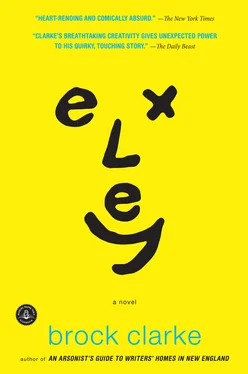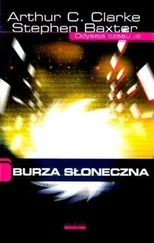“Dad, did you tell the dummy to shovel because you were critiquing the dummy’s Protestant work ethic?”
My dad looked at me in the rearview, his eyes brightening. Mother looked at my dad; her eyes were bright, too, but in a different way. She opened her mouth to say something but then didn’t. She turned away from my dad and toward her window, just in time for my dad to look in her direction.
“What?” my dad said.
“Nothing,” Mother said. “I was just looking out the window and enjoying the scenery.”
My dad didn’t seem to believe it, maybe because the scenery was Watertown, which we all knew Mother didn’t enjoy. My dad waited for a few more seconds for Mother to say something else, or to think of something else to say to her. Finally he looked back at me in the rearview and said, “What do you think?”
“I think it was a critique of the dummy’s Protestant work ethic,” I said. “I think the dummy had too much of it.”
“I think you’re right,” my dad said. He smiled at me in the mirror and then looked at Mother, who by now had smushed her face right up against the window and was not smiling.
Use Your Mine-Duh
Iwoke to find Mother standing over me. She had on her Monday work clothes. She wore a different outfit for every day of the week. On Fridays she wore her dark blue pin-striped pantsuit, just to show people that the week wasn’t over and she meant business. On Mondays she wore a black pin-striped pantsuit, just to show people that the weekend was over and she meant business. “Hi, Mom,” I said.
“Hey, sweetie,” she said. We were always nicer to each other first thing in the morning. I don’t think any of the books I’ve read, including Exley’s, ever said why people were nicer to each other in the morning. Maybe people weren’t. Maybe Mother and I were the only ones. She bent down to kiss me, put her right hand on the left side of my pillow for support. I was afraid she was going to feel A Fan’s Notes underneath the pillow, but she didn’t. “Time to get up for school,” Mother said, and kissed me on the forehead.
“OK,” I said. I shifted my head a little and could feel the book move toward Mother’s hand. I knew that I should be getting up, that Mother wanted me to, but I was afraid if I moved my head any more, the book might reveal itself. So I kept my head on the pillow.
“I have to leave for work,” she said. “Please eat some breakfast before you go to school, OK?”
“OK.”
Mother took her hand off the pillow, stood up straight, then looked at her watch and frowned. “Miller, you really need to get up.”
“OK,” I said. I could feel our early morning nice feelings burning off, like dew. Mother could feel it, too.
“I’m sorry to be such a nag,” Mother said. “I love you.”
I loved her, too. But I didn’t feel like I could say so just then. “OK,” I told her instead, again. Mother nodded, like she’d just lost a trial she knew she was going to lose. Then she was gone, out the door, and our nice feelings were gone, too, until the next morning, when we’d start all over again.
I DIDN’T WANT to go to school. I wanted to see my dad; I wanted to keep trying to find Exley. But I knew if I didn’t go to school, then school would tell Mother, and Mother would know something was up. If Mother knew something was up, she’d get me to tell her what it was. She’d ruin everything.
So I got dressed, put A Fan’s Notes in my backpack, ate two bags of mini blueberry muffins and drank a juice box, then walked to school. My first class on Monday was with Mrs. T. In her classroom, above the blackboard, Mrs. T. had tacked up a poster. The poster was broken up into four panels. Each of the panels had a brain. The brains were bright red, like lobsters, and each of the brains had a pair of hands with white gloves on them. In the first panel, the brain was wearing safety goggles and pouring the contents of one test tube into another. In the second panel, the brain was reading the dictionary. In the third panel, the brain was holding a sign with the word CANCER crossed out. In the fourth panel, the brain was wearing a hard hat; its hands were holding either end of a blueprint, a half-built skyscraper rising behind it. At the top of the poster were the words USE YOUR MIND. This happened to be Mrs. T.’s favorite expression, too, except she pronounced it “mine-duh” not “mind.” As in “Miller, use your mine-duh.” Anyway, she taught advanced reading, although it was two months into the school year and we mostly hadn’t read anything yet.
We mostly hadn’t read anything yet, except for the stuff we’d written. Mrs. T. called this “freewriting.” We “freewrote” every day in class. Although it wasn’t exactly free; Mrs. T. would tell us what to write. She called this a “prompt.” The “prompt” was always just one word. Mrs. T. would say, “Mountain.” Or “Family.” Or “Rope.” Then she’d look at her watch and say, “Begin.” And then we’d “freewrite” for fifteen minutes, whatever we wanted as long as it related in some way to the “prompt.” Then Mrs. T. would look at her watch and say, “One minute remains.” One minute later, she’d say, “Stop.” And then one by one we’d read our responses aloud, until the second bell rang. That was advanced reading.
I got there just as the first bell rang. I sat in my assigned seat, next to J., with the zipper scar on her right cheek, who sat next to R., who did not want to be called B., who sat next to L., who began each sentence with the word “so,” who sat next to P., who was black. And so on. They were all at least five years older than me, everyone in the class, including Harold, whose assigned seat was at the far end of the room. He waved to me like a lunatic when I came in. But I didn’t wave back. Harold was my only friend. It makes me sad to say that. But I was Harold’s only friend, too. That made it even sadder for him. Because he was five years older than me; he’d had five extra years to make another friend and hadn’t. But besides Harold, no one else paid much attention to me. I knew from Exley’s book that he hadn’t fit in as a teacher. I wondered if he hadn’t fit in as a student, either. I wondered if he was like me, if he’d felt like a nine-year-old in a class with a bunch of fourteen-year-olds. I wondered if his classmates had treated him like they treated me, like a pet that had one trick: I could read anything, and fast. But that was my only trick. When the older kids realized that, they got bored and ignored me. I wondered if Exley was like that when he was a kid. I wondered if he was still like that.
Mrs. T. watched me climb into my desk chair, pull out my pencil and a piece of paper, and basically get ready to start “freewriting.” But then I was ready and Mrs. T. was still looking at me. “Miller, use your mine-duh,” she finally said. I must have looked at her in a way that told her I thought I was already using it. “Did you forget what we’re doing today?” she asked. When she said that, I looked around and saw that everyone had books on their desks, in addition to their pencils and pieces of paper. Then I remembered. This was the week when everyone in school discussed this year’s America on the Same Page book. Like last year’s, this year’s book was about a war (I guessed that every America on the Same Page book would be about a war until America stopped being in one), except this year the book was about an old war, where people rode horses instead of planes and helicopters and tanks, and fired pistols instead of automatic rifles. I say “people,” but it was really about a boy who was too young to fight in the war but joined the army anyway because his father had fought and died in the war and the boy loved his father and he also loved his father’s horse and gun, which were now the boy’s, since his father had died, and which the boy took into battle, which he couldn’t stop talking about: he couldn’t stop talking about the bodies and the bullets and the blood, the blood, and it was clear that the boy, or the author, or both, loved the battles and the bodies and the bullets and the blood, too, even though he, or they, kept saying how really terrible it all was.
Читать дальше












